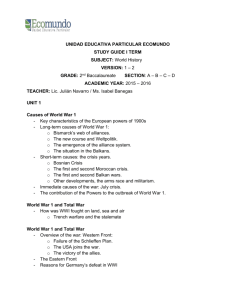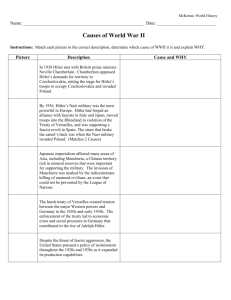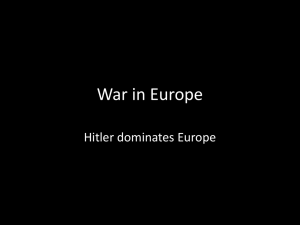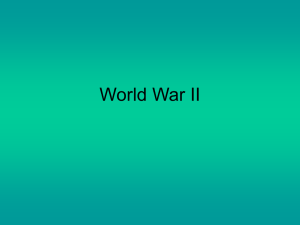Model answers: Why did Peace fail in 1939?
advertisement
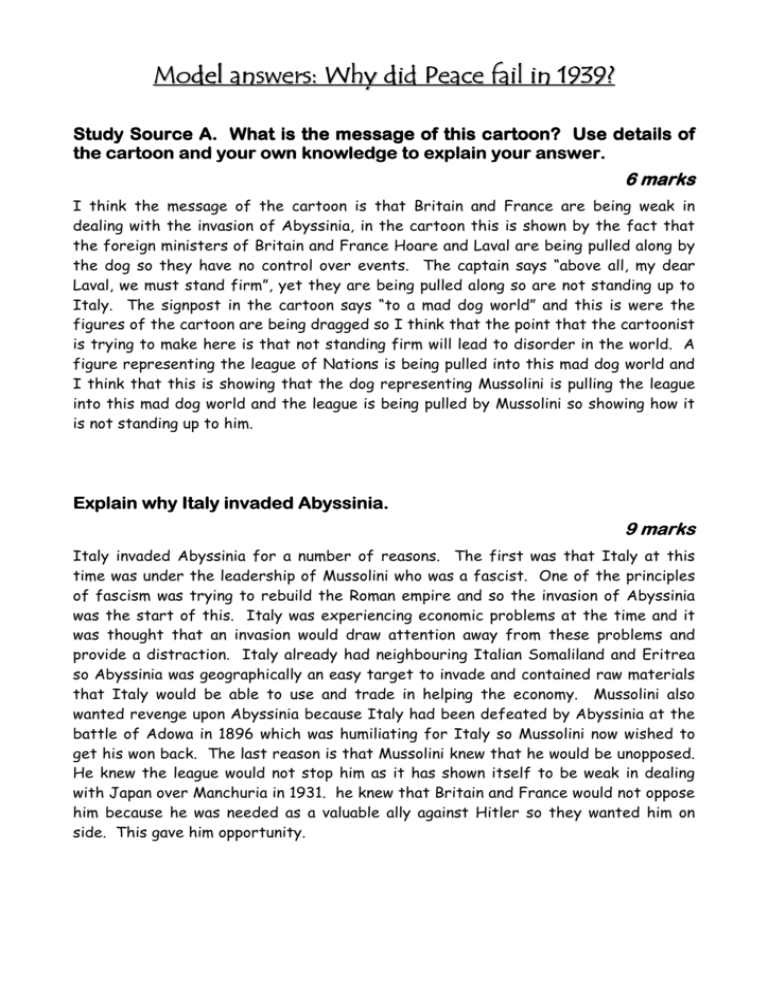
Model answers: Why did Peace fail in 1939? Study Source A. What is the message of this cartoon? Use details of the cartoon and your own knowledge to explain your answer. 6 marks I think the message of the cartoon is that Britain and France are being weak in dealing with the invasion of Abyssinia, in the cartoon this is shown by the fact that the foreign ministers of Britain and France Hoare and Laval are being pulled along by the dog so they have no control over events. The captain says “above all, my dear Laval, we must stand firm”, yet they are being pulled along so are not standing up to Italy. The signpost in the cartoon says “to a mad dog world” and this is were the figures of the cartoon are being dragged so I think that the point that the cartoonist is trying to make here is that not standing firm will lead to disorder in the world. A figure representing the league of Nations is being pulled into this mad dog world and I think that this is showing that the dog representing Mussolini is pulling the league into this mad dog world and the league is being pulled by Mussolini so showing how it is not standing up to him. Explain why Italy invaded Abyssinia. 9 marks Italy invaded Abyssinia for a number of reasons. The first was that Italy at this time was under the leadership of Mussolini who was a fascist. One of the principles of fascism was trying to rebuild the Roman empire and so the invasion of Abyssinia was the start of this. Italy was experiencing economic problems at the time and it was thought that an invasion would draw attention away from these problems and provide a distraction. Italy already had neighbouring Italian Somaliland and Eritrea so Abyssinia was geographically an easy target to invade and contained raw materials that Italy would be able to use and trade in helping the economy. Mussolini also wanted revenge upon Abyssinia because Italy had been defeated by Abyssinia at the battle of Adowa in 1896 which was humiliating for Italy so Mussolini now wished to get his won back. The last reason is that Mussolini knew that he would be unopposed. He knew the league would not stop him as it has shown itself to be weak in dealing with Japan over Manchuria in 1931. he knew that Britain and France would not oppose him because he was needed as a valuable ally against Hitler so they wanted him on side. This gave him opportunity. Study Source A. What is the message of this cartoon? Use details of the cartoon and your own knowledge to explain your answer. 6 marks The message of the cartoon is in correspondence to the promise Hitler had made to Chamberlain regarding the outbreak of war. It shows Hitler dressed in the image of Father Christmas. The cartoon shows Hitler dropping babies into his sack. The relevance of the babies is that they are defenceless. The cartoon is implying that Germany knows of the defencelessness of many countries, such as Austria, Czechoslovakia and Bulgaria and adds them to his Reich. The caption, “Europe can look forward to a Christmas of peace”, has a double meaning and it is making reference to both the absence of children and Hitler’s promise that war would not break out. It is also making reference to the break up of Europe and how they were once all controlled by Britain and France but now Hitler dominates. The cartoon also shows how, due to the policy of appeasement, no-one was making a stand against Hitler, again this is portrayed by the babies. Some of the babies are crying but such an action is not enough to stop Hitler. The caption, “Germany above all others” portrays Hitler’s belief of German supremacy. As Hitler is disguised as Santa it shows how people do not realise his bad aspect. Explain why Britain followed a policy of appeasement towards Hitler’s Germany. 9 marks Britain followed a policy of Appeasement under Neville Chamberlain. They did this because they already felt the Treaty of Versailles was too harsh and that Germany had legitimate grievances about it. This meant they were willing to allow Germany some leeway. Chamberlain saw some saw that Britain would face strategic problems if war broke out in the Far East, so he wanted to find out what Hitler wanted and give it to them. He had also seen the destruction World War I had caused and didn’t want another generation wiped out. Chamberlain realised there would be more destruction as weapons had been developed since. Chamberlain felt Germany was entitled to allowances for its military aspects and so was willing to allow this. He also believed Germany had paid a high price enough for their past in the war. Chamberlain did not want to enter war again so he felt appeasement was the way. The British army was in no state to fight a war but the RAF was rearming rapidly in case appeasement failed. Chamberlain wanted focus on her own Empire rather than be at war. He also wanted Germany strong so that it could act as a buffer to Communism and maintain a healthy trading partner. What was agreed at the Munich Conference in 1938? 4 marks It was agreed that Germany would take the Sudetenland but that Germany would not touch the rest of Czechoslovakia. It was also agreed that Britain and Germany would never go to war with each other again and that they would solve their differences through discussion. What were the main aims of Hitler’s foreign foreign policy? 4 marks To reverse the Treaty of Versailles, to unite all German speaking peoples and to gain lebensraum or living space for the German people by conquering land to the east. Nazi--Soviet Pact Explain why Germany and the Soviet Union signed the Nazi in 1939? 6 marks Stalin signed it because he felt let down by Britain and France. They had gone ahead without Russia and signed the Munich Agreement. Stalin thought this meant that Britain and France could not stop Hitler. If he invaded Russia, they would not help. So Stalin decided he had better sign the Pact to make sure Germany did not go to war with Russia and also to buy some time if they did eventually invade. Explain why Hitler wanted to take over Czechoslovakia. 6 marks Hitler planned to dominate Europe, but in order to do this he had to increase the power of the Third Reich. The take-over of Czechoslovakia strengthened the Reich militarily and industrially. This was because it contained precious raw materials and a lot of important industry including the famous Skoda factory. Hitler also wanted to take over Czechoslovakia because it contained large numbers of Germans, especially in the Sudetenland. Hitler claimed that these Germans were being mistreated and said that they needed to be protected. Hitler also wanted to test the strength of Britain and France. The following were all equally important reasons why there was a world war in 1939: (i) Hitler’s aggressive foreign policy; (ii) the failure of the League of Nations; (iii) the policy of appeasement. Do you agree with this statement? Explain your answer referring only to (i), (ii) and (iii). 10 marks World War was inevitable in 1939. many factors had already collided giving many nations no choice but to fight a war. The first of these factors was Hitler’s Foreign policy. He intended to unite all German speakers which meant regaining land lost in world war I. this policy was started with his remilitarisation of the Rhineland and ended with the invasion of Poland which was the trigger for the war. However, it is often seen as the case that Hitler would not have attempted to regain the land he did if the British policy of appeasement had not been followed. From 1936 when Hitler remilitarised the Rhineland the British government followed this policy by allowing Hitler to remain there with the hope that he would not continue. This policy continued when Hitler was granted the Sudetenland at Munich in 1938. he later invaded Czechoslovakia showing that appeasement had failed and this just gave Hitler the confidence to continue. For example, when Mussolini stopped Anschluss in 1934 Hitler made no more aggressive moves until the Anti-Comintern Pact was signed in 1936, showing he was scared. Also boosting his confidence were the failures of the League of Nations. When Hitler took power in 1933 it had been eight years since the League had successfully resolved a crisis giving Hitler nothing to fear in the way of an international authority. Also the leagues failures in Abyssinia gave Hitler the distractions he needed to invade Abyssinia. It is clear that although Hitler’s foreign policy caused the majority of events leading to the outbreak of world war two the failures and weaknesses of the international community also played a huge role. Without the policy of appeasement then Hitler would not have had the confidence to continue and a strong league would have stopped him if he did. It is therefore clear that the statement is true. Question 4c Explain how the following together contributed to the success of Germany’s foreign policy in the 1930s: (i) Hitler’s leadership; (ii) the weakness of the League of Nations; (iii) the policy of appeasement. 10 marks Hitler had clear aims when he became Chancellor in 1933. he was prepared to go against the Treaty of Versailles and his military threats were not empty. Immediately in 1934, Hitler attempted Anschluss with Austria and this did not fail due to swift action by the League but due to movement of Italian troops – by the Stresa Front. Hitler realised that the Stresa Front between Britain, France and Italy was very strong and used his insight and determination to appeal to Italy. In 1935, Italy invaded Abyssinia and despite, breaking almost every rule in the League’s covenant, the League did nothing. Firstly this demonstrated to Hitler how weak the League had become and how easy it was to overcome as really the only weapon it had was the weight of world opinion which was rapidly disregarded by Hitler. Secondly the Abyssinian Crisis meant the break up of the Stresa front and Italy moved into the camp of Hitler and Nazi Germany. Under Hitler’s leadership the Saarland again came under Nazi control – a further sign of encouragement to Hitler. Hitler’s foreign policy also included the remilitarisation of the Rhineland which was described as ‘walking into their own backyard’. This aggression displayed by Hitler was a vital part in Germany’s success, alongside the continuing decline of the League’s credibility. The League had no army and there was voluntary compliance with the Court of International Justice so the League never posed a major threat to Hitler. Numerous failures were viewed by both members and non-members and it was soon clear that the League could no longer achieve its main aim – to ensure peace in Europe. In 1938, Neville Chamberlain travelled to Munich to meet Hitler. Chamberlain was concerned by the demands for the Sudetenland that Hitler was making. Chamberlain operated a policy of appeasement and so the Munich Agreement was drawn up. This stated that Germany could have the Sudetenland but it guaranteed the rest of Czechoslovakia. Chamberlain returned to Britain proclaiming ‘peace in our time’ but in early 1939, he was proved wrong. Hitler had invaded the rest of Czechoslovakia. By generating a policy of appeasement, Hitler had been able to delay any confrontations with the west while vital re-arming processes were taking place. As appeasement was demonstrated by Britain, Hitler now knew that Britain and probably France were unwilling to use military force to stop Hitler. He felt that he had stretched the limitations even further. All three factors contributed greatly to the success of Germany’s foreign policy. Hitler striving for agreements (Rome-Berlin-Tokyo Axis) and aggressive policy coupled with the league’s poor reputation and the reluctance of other major powers to fight meant that Hitler’s foreign policy was more successful than perhaps even Hitler had hoped.

